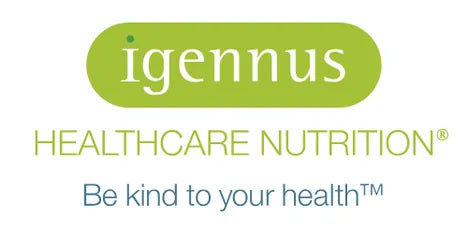Supplementing with collagen is a trend that’s here to stay. While many take collagen for skin benefits (which is what hits headlines), it is backed by solid science supporting a wide array of health benefits. Igennus Healthcare Nutrition Advanced Hydrolysed Collagen Peptides from grass-fed, pasture raised cattle is a pure source of vital collagen building blocks and our neutral-tasting, easy-dissolve formula can be effortlessly incorporated into your daily routine.
What is collagen?
Collagen is the main structural protein in the body, giving strength and elasticity to bones, skin, hair & nails, cartilage, tendons, ligaments and even blood vessels. It also forms connective tissue, the ‘glue’ that holds us together. Fibroblasts make collagen, but starting at about age 35, production naturally slows down. In our 40s, collagen is broken down faster than it is produced, and by age 60, over half of the body’s collagen has been depleted.
All collagen is made up of sets of 3 amino acids (tripeptides), joined together in triple helix chains. The ‘type’ of collagen is determined by the way in which these are arranged in tissues - e.g. type I in strong fibrous structures such as tendons, bones and skin, type II in joint cartilage, and type III in blood vessels and hollow organs.
Sources of collagen in the diet
Our ancestors got plenty of collagen by eating the connective tissues, tendons and other odds and ends of animals. However, although this traditional ‘nose-to-tail’ eating and slow-cooking of collagen-rich cuts and bones is beginning to find its place again, in the modern western diet it is still mostly shunned in favour of convenient muscle meats, and chicken and fish skin are often not eaten.
Our bodies have a limited capacity to produce glycine, the main amino acid in collagen, and the remaining deficit must be made up by dietary intake or supplements. Those who eat significant amount of muscle meats and eggs rich in the amino acid methionine, need even more glycine-rich food such as collagen, because it is needed for methionine metabolism.
Aglommerated Hydrolysed Collagen Peptides vs Gelatine and Bone Broth
The form of collagen found in bone broth and gelatine is actually quite different from supplements containing hydrolysed peptides, a concentrated source of body-ready collagen building blocks.
Hydrolysed peptides are sourced from collagen extracted from hides or other animal sources, reacted with water and heat to form gelatine, and broken down by enzymes into small protein fragments. These tiny peptides can be absorbed whole, without needing further digestion and can easily be reassembled into collagen in the body where they are needed. Aglommeration, an advanced spray-drying technique, produces a collagen powder that dissolves almost instantly without clumping, and has a more neutral taste and odour.
Gelatine, which is basically cooked collagen, has not undergone processing to predigest it, and is less bioavailable as the body only absorbs what is broken down into small enough fragments as it passes through the digestive tract. Gelatine causes liquids to thicken, so unlike hydrolysed collagen peptides it is not suitable for adding to liquids to drink.
Bone broth, which is made by simmering animal bones and connective tissues in water for long periods, contains gelatine along with other nutrients such as minerals. The collagen from these sources also needs to undergo digestion before being absorbed, and large quantities of bone broth would need to be consumed to achieve the same level of peptides as from a hydrolysed collagen supplement. (1)
Health Benefits
Collagen makes up 75% of the dry weight of skin, so we can see how decreased collagen production during ageing causes wrinkles and decreased skin elasticity. Furthermore, ageing affects collagen architecture, leading to rough, less plump skin. It’s therefore no surprise that the most expensive face creams in the world won’t erase wrinkles. Studies show that collagen supplementation noticeably improves skin elasticity, hydration & smoothness and decreases wrinkles. (2, 3) ‘Beauty from within’ is further boosted by collagen’s ability to decrease cellulite (4),and improve the condition of hair and brittle nails. (5)
Musculoskeletal health is another popular reason for supplementing. In those who get achy joints when exercising, hydrolysed collagen has been shown to lengthen the period of pain-free activity, improve joint mobility and recovery time, and decrease the need for additional therapies such as physiotherapy and ice packs. (6, 7) Research shows benefits for both osteo- and rheumatoid arthritis. Patients taking collagen daily had less joint pain and an improvement in physical activities. (8, 9)In combination with resistance training, collagen supplementation yields significantly increased muscle mass and strength gains. (10, 11)Lending structural strength to bones, collagen has been shown to increase bone mineral density in postmenopausal women. (12)Those struggling with tendon injuries will find hope from trial results proving increased tendon vascularisation and decreased symptoms, leading to faster return to usual physical activity. (13)
An unexpected benefit of collagen supplementation is positive metabolic effects. As diets low in glycine are a risk factor for diabetes (14), collagen supplementation may be protective. Even in those diagnosed with diabetes, research shows better control of blood glucose and improved cholesterol profile. (15) Reducing stiffness of blood vessels is important for cardiovascular health and normal blood pressure, and collagen is clinically proven to decrease arterial stiffness, thanks to its role in the structure of blood vessel walls. (16)
Those trying to lose weight might consider supplementing before a meal – as collagen, naturally high in protein, brings about a feeling of fullness, decreasing the chance of overeating during a meal and snacking afterwards. (17) Collagen even improves sleep and decreases daytime fatigue after sleep deprivation. (18, 19)
Last, but not least- over the past few years there has been increasing awareness of the role that gut health plays in so many body systems including immunity, brain health and mood, and the likely role of ‘leaky gut’ in causing a variety of chronic health conditions. The amino acids in collagen peptides repair and seal the gut, decreasing gut permeability and protecting against ulcers. (20, 21)
Making collagen part of your daily routine
Hydrolysed peptides are easily mixed into hot or cold drinks without changing their texture. The powder can also be stirred into sweet or savoury, hot or cold food. Usually taken in doses of 5-20 grams daily, as little as 2.5g daily has proven skin and cellulite improvement. It’s important to take collagen regularly to achieve optimal benefits.
How to choose a collagen supplement
Bioavailable collagen powders may go under the name of hydrolysed collagen, collagen peptides or collagen hydrolysate. The best of these supplements use agglomeration technology for an ultra-soluble, easy-mix product and are more neutral tasting. If you’ve tried one brand and didn’t like it, do try a more premium product as collagen peptides vary considerably in smell, taste and solubility. To ensure purity, it’s important to look for a product made from grass-fed, pasture-raised cattle which were not given hormones, steroids or synthetic drugs. Marine collagen, made from fish skin and bones, has no proven benefits over bovine.
Additional ways to stimulate collagen production
Vitamin C is needed to process pro-collagen into collagen, so ensure a regular supply of fruits and vegetables such as citrus, kiwi, berries, bell pepper and broccoli.
Zinc is involved in cleaving long collagen chains into smaller pieces for repair and building of new tissues. Rich sources of zinc include meat, shellfish, legumes, nuts and seeds.
Get enough sleep – as collagen is produced at a greater rate during restorative slumber, getting your ‘beauty sleep’ is not fiction. (22)
Exercise is a potent regulator of collagen production, with increased collagen creation seen up to 72 hours after exercise. (23)
References
- Alcock RD, Shaw GC and Burke LM. Bone Broth Unlikely to Provide Reliable Concentrations of Collagen Precursors Compared With Supplemental Sources of Collagen Used in Collagen Research. Int J Sport Nutr Exerc Metab. 2019 May 1;29(3):265-272. doi: 10.1123/ijsnem.2018-0139.
- Choi F et al (2019) Oral Collagen Supplementation: A Systematic Review of Dermatological Applications J Drugs Dermatol. 2019 Jan 1;18(1):9-16.
- Proksch E et al. (2014) Oral Intake of Specific Bioactive Collagen Peptides Reduces Skin Wrinkles and Increases Dermal Matrix Synthesis. Skin Pharmacol Physiol 2014;27:113-119. https://doi.org/10.1159/000355523
- Schunck M, Zague V, Oesser S, Proksch E. Dietary Supplementation with Specific Collagen Peptides Has a Body Mass Index-Dependent Beneficial Effect on Cellulite Morphology. J Med Food. 2015;18(12):1340–1348. doi:10.1089/jmf.2015.0022
- Doris Hexsel MD et al (2017).Oral supplementation with specific bioactive collagen peptides improves nail growth and reduces symptoms of brittle nails First published:08 August 2017 https://doi.org/10.1111/jocd.12393
- Clark K et al. (2008) 24-Week study on the use of collagen hydrolysate as a dietary supplement in athletes with activity-related joint pain. https://doi.org/10.1185/030079908X291967 Accepted 29 Feb 2008, Published online: 15 Apr 2008
- Zdzieblik D et al (2017) Improvement of activity-related knee joint discomfort following supplementation of specific collagen peptides Applied Physiology, Nutrition and Metabolism 2017 Jun;42(6):588-595. doi: 10.1139/apnm-2016-0390.
- Benito-Ruizet P et al. (2009) A randomized controlled trial on the efficacy and safety of a food ingredient, collagen hydrolysate, for improving joint comfort, International Journal of Food Sciences and Nutrition, 60:sup2, 99-113, DOI: 10.1080/09637480802498820
- Schauss et al J. Effect of the Novel Low Molecular Weight Hydrolyzed Chicken Sternal Cartilage Extract, BioCell Collagen, on Improving Osteoarthritis-Related Symptoms: A Randomized, Double-Blind, Placebo-Controlled Trial Agric. Food Chem. 2012, 60, 16, 4096-4101
- Zdzieblik D, Oesser S, Baumstark MW, Gollhofer A, König D. Collagen peptide supplementation in combination with resistance training improves body composition and increases muscle strength in elderly sarcopenic men: a randomised controlled trial. Br J Nutr. 2015;114(8):1237–1245. doi:10.1017/S0007114515002810
- Jendricke P, Centner C, Zdzieblik D, Gollhofer A, König D. Specific Collagen Peptides in Combination with Resistance Training Improve Body Composition and Regional Muscle Strength in Premenopausal Women: A Randomized Controlled Trial. Nutrients. 2019;11(4):892. Published 2019 Apr 20. doi:10.3390/nu11040892
- König D, Oesser S, Scharla S, Zdzieblik D, Gollhofer A. Specific Collagen Peptides Improve Bone Mineral Density and Bone Markers in Postmenopausal Women-A Randomized Controlled Study. Nutrients. 2018;10(1):97. Published 2018 Jan 16. doi:10.3390/nu10010097
- Praet SFE, Purdam CR, Welvaert M, et al. Oral Supplementation of Specific Collagen Peptides Combined with Calf-Strengthening Exercises Enhances Function and Reduces Pain in Achilles Tendinopathy Patients. Nutrients. 2019;11(1):76. Published 2019 Jan 2. doi:10.3390/nu11010076
- Wittenbecher C et al. Amino acids, lipid metabolites, and ferritin as potential mediators linking red meat consumption to type 2 diabetes, The American Journal of Clinical Nutrition, Volume 101, Issue 6, June 2015, Pages 1241–1250, https://doi.org/10.3945/ajcn.114.099150
- Zhu C et al (2010)Treatment with marine collagen peptides modulates glucose and lipid metabolism in Chinese patients with type 2 diabetes mellitus Applied Physiology, Nutrition, and Metabolism, 2010, 35:797-804, https://doi.org/10.1139/H10-075
- Tomosugi N, Yamamoto S, Takeuchi M, et al. (2017) Effect of Collagen Tripeptide on Atherosclerosis in Healthy Humans. J Atheroscler Thromb. 2017;24(5):530–538. doi:10.5551/jat.36293
- Rubio IG1, Castro G, Zanini AC, Medeiros-Neto G. Oral ingestion of a hydrolyzed gelatin meal in subjects with normal weight and in obese patients: Postprandial effect on circulating gut peptides, glucose and insulin. Eat Weight Disord. 2008 Mar;13(1):48-53.
- Bannai M1, Kawai N. (2012) New therapeutic strategy for amino acid medicine: glycine improves the quality of sleep. J Pharmacol Sci. 2012;118(2):145-8. Epub 2012 Jan 27
- Bannai M, Kawai N, Ono K, Nakahara K, Murakami N. (2012)The effects of glycine on subjective daytime performance in partially sleep-restricted healthy volunteers. Front Neurol. 2012;3:61. Published 2012 Apr 18. doi:10.3389/fneur.2012.00061
- Tariq M (1997) Studies on the antisecretory, gastric anti-ulcer and cytoprotective properties of glycine. Res Commun Mol Pathol Pharmacol. 1997 Aug;97(2):185-98.
- Chen Q et al. (2017) Collagen peptides ameliorate intestinal epithelial barrier dysfunction in immunostimulatory Caco-2 cell monolayers via enhancing tight junctions. Food Funct. 2017 Mar 22;8(3):1144-1151. doi: 10.1039/c6fo01347c.
- Kahan et al (2010) Can poor sleep affect skin integrity ? Medical Hypotheses
- Volume 75, Issue 6, December 2010, Pages 535-537 https://doi.org/10.1016/j.mehy.2010.07.018
- Alcock RD, Shaw GC, Tee N, Burke LM. (2019)Plasma Amino Acid Concentrations After the Ingestion of Dairy and Collagen Proteins, in Healthy Active Males. Front Nutr. 2019;6:163. Published 2019 Oct 15. doi:10.3389/fnut.2019.00163








